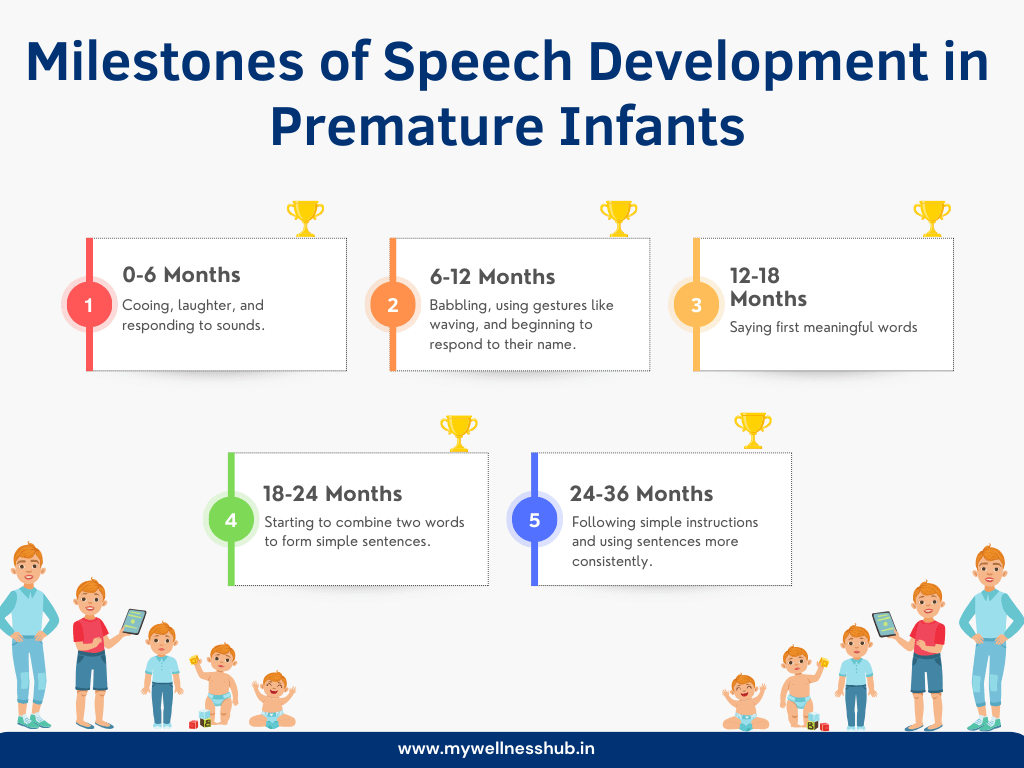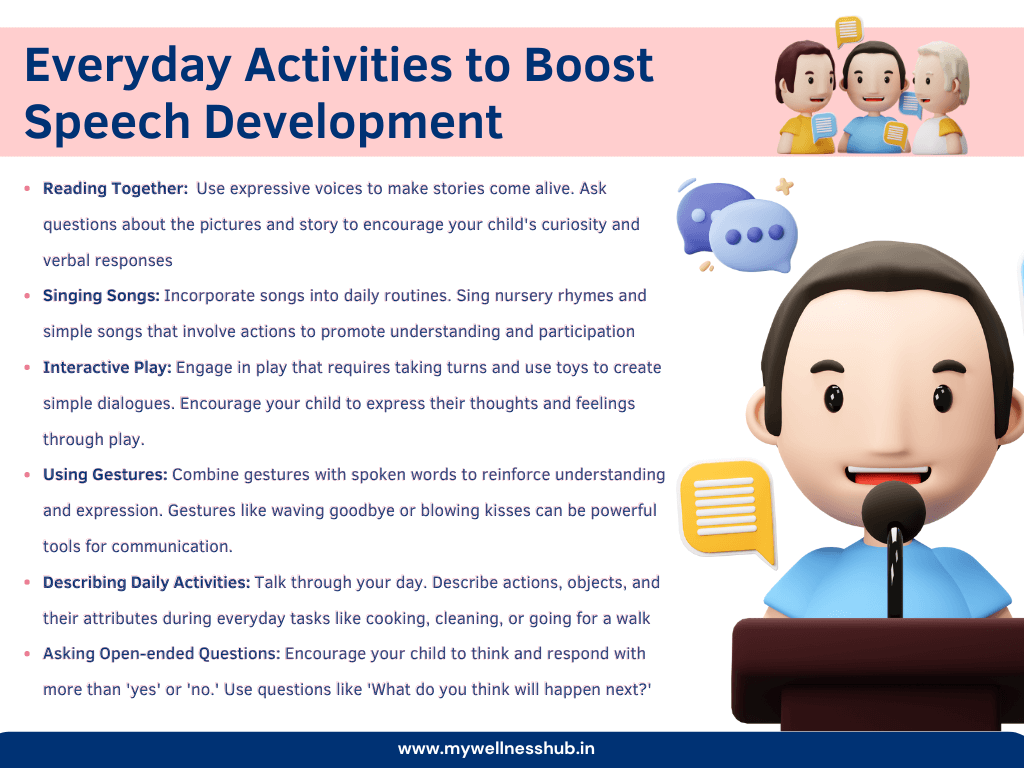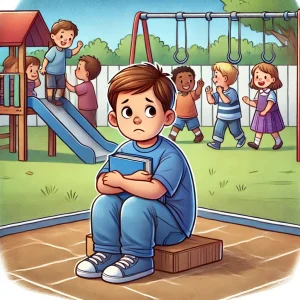Speech Delays in Premature Infants: What Parents Need to Know
By Rajini D
Last Updated: April 17, 2024
Welcome to a journey of understanding, support, and guidance—a journey where your concerns about your little one’s speech and language development find answers and reassurance. If you’re reading this, chances are you’re the parent of a precious premature infant, and you’re wondering about the path ahead, especially when it comes to their ability to communicate. It’s a path many parents walk with a mix of hope, concern, and countless questions. “Will my child speak like other kids their age?” “What can I do to help them along?“—these are questions we hear often, and you’re not alone in asking them.
Premature infants, with their early start in life, sometimes face unique challenges as they grow. One of these challenges may be delays in speech and language development. It’s a topic that brings many parents to seek answers, looking for ways to support their child’s journey to those first words and beyond. But here’s something we’ve learned through years of supporting families just like yours: understanding the journey and getting involved early can make a world of difference.
Also read: 9 Effective Exercises to Overcome Speech Delay in Toddlers
Understanding Speech Delays in Premature Infants
Navigating the development of a premature infant can sometimes feel like uncharted territory for many parents. As you watch every milestone with bated breath, it’s natural to wonder about the pace and progress of your child’s speech and language development. Let’s gently unfold why premature infants might face these challenges and how you can spot the early signs, guiding your next steps with love and awareness.
What Makes Premature Infants Susceptible?
Premature infants, those born before 37 weeks of gestation, often have an incredible journey ahead from the moment they arrive. Their early start in life means that some aspects of development, including speech and language, may take a bit more time. This isn’t due to a lack of ability or potential but rather because their developmental timeline starts earlier than that of full-term babies.
Several factors contribute to this susceptibility:
- Immature Development: Key organs and systems, including the brain, are still developing in the final weeks of pregnancy. Premature birth interrupts this process, which can affect various areas of development, including speech and language.
- Health Challenges: Many preemies face health challenges that require medical attention, such as respiratory support. These early experiences can influence their initial interactions and communication opportunities.
- Sensory Experiences: The sensory environment of a neonatal intensive care unit (NICU) is vastly different from the womb, potentially affecting a premature infant’s early sensory development, which is foundational to speech and language learning.
Understanding these challenges not only brings awareness but also opens doors to targeted support and interventions that can bridge gaps and foster development.
Also Read: Early Identification/ Warning Signs in child development.
Recognizing the Signs

Early detection and support can significantly impact the speech and language development of premature infants. Recognizing the signs of potential delays involves observing your child’s communication milestones, keeping in mind their adjusted age. Here’s how to do it:
- Adjusted Age: Always consider your child’s corrected age when looking at developmental milestones. For example, if your baby was born two months early, at 6 months old, you would look at the 4-month-old milestones for guidance.
- Eye Contact and Responsiveness: From as early as 0-3 months (adjusted age), does your baby make eye contact? Do they startle or respond to loud sounds? These early interactions are precursors to more complex communication skills.
- Babbling and Sound Play: Around 4-6 months (adjusted age), babies typically begin to babble and play with sounds. Delayed or limited babbling can be an early sign of speech delay.
- Responding to Their Name: By 6-9 months (adjusted age), infants usually respond to their names. A lack of response can indicate a need for further evaluation.
- Gestures: Simple gestures like waving bye-bye or pointing, typically emerging by 9-12 months (adjusted age), are important for non-verbal communication and later speech development.
- First Words: Speaking simple words beyond babbling by 12-15 months (adjusted age) is a milestone to watch for. Delays in this area might prompt a discussion with your healthcare provider.
Remember, every child is unique, and development is not a race. If you notice any signs that concern you, reaching out for support is a positive step forward.
The Role of Early Intervention
Embarking on the journey of early intervention is akin to setting sail towards a brighter future for your child. It’s about harnessing the power of timely support to navigate the waters of speech and language development with confidence and optimism. Let’s explore how early intervention acts as a beacon of hope, illuminating the path forward and how you can find the right support that resonates with your child’s unique needs.
The Power of Timely Support
The importance of early intervention cannot be overstated. Think of it as providing your child with a map and compass in the formative years of their life. Early intervention refers to the services and supports available to babies and young children with developmental delays and disabilities and their families. It’s a proactive approach designed to capitalize on the neuroplasticity of young brains, which are incredibly adaptable and responsive to learning and growth.
Why Early Intervention?
- Maximizes Potential: Early intervention can significantly influence your child’s ability to communicate, interact, and thrive by addressing speech and language delays as soon as they’re noticed.
- Family Support: It also provides families with the tools, resources, and support they need to nurture their child’s development effectively.
- Builds Confidence: For the child, it fosters a sense of achievement and self-esteem as they learn to express themselves and connect with the world around them.
The journey of early intervention is paved with milestones and victories, big and small. It’s about celebrating each step forward, knowing that each word, gesture, and interaction is a leap toward unlocking their full potential.
Read more: Speech Delay vs Autism: Key Differences Explained
Finding the Right Help
Navigating the seas of early intervention services can feel daunting at first. Yet, finding the right support is akin to discovering a guiding star in the night sky. Here are some steps to help you chart the course:
- Start with Your Pediatrician: Your child’s doctor can be your first port of call. They can assess your child’s development and refer you to speech therapy services if needed.
- Research Your Options: Look for certified speech-language pathologists (SLPs) with experience in early intervention and working with premature infants. Websites like Wellness Hub offer directories and resources to connect you with specialists.
- Consider the Setting: Speech therapy can be provided in various environments, including clinics, at home, or even online. Consider what would be most comfortable and effective for your child and family.
- Check Reviews and References: Hearing from other parents about their experiences can provide insights into what to expect and help you make an informed decision.
- Ask Questions: When you meet with a potential therapist, ask about their experience, approach, and how they plan to involve you in your child’s progress.
At Wellness Hub, we understand that every child’s journey is unique. Our platform is designed to connect you with resources, professionals, and support networks tailored to your needs. We believe in a world where every child can find their voice, and we’re here to support you every step of the way.
Practical Tips for Parents at Home

As you navigate the day-to-day journey with your little one, your home becomes the first classroom, and you, the first teacher. There’s a world of learning and discovery between the walls where you live, offering countless opportunities to encourage speech and language development.
Everyday Activities to Encourage Speech
- Narrate Your Day: Turn the mundane into the magical by talking through your daily activities. Whether you’re sorting laundry or preparing a meal, describe your actions in simple sentences. “I’m cutting carrots,” or “We’re folding the blue shirt.” This constant stream of language immersion helps your child connect words to actions and objects.
- Read Together: Books are gateways to new worlds, sounds, and words. Choose colorful picture books and read aloud, pointing to and naming objects as you go. Encourage interaction by asking simple questions like “Where’s the cat?” or pausing to let your child point to pictures.
- Sing Songs and Rhymes: Music and rhythm are excellent for language development. Sing nursery rhymes and simple songs, and make melodies about everyday tasks. The repetitive and melodic nature of songs helps with memory and word recognition.
- Play Interactive Games: Engage in games like peek-a-boo, pat-a-cake, or simple puzzles that require turn-taking and interaction. These games not only bring joy but also encourage listening, attention, and the anticipation of words and actions.
- Use Technology Wisely: While screen time should be limited, there are high-quality educational apps designed to encourage language development. Choose those that require parental interaction, promoting joint attention and engagement.
Read more: Can Parenting Styles Lead to Speech Delays in Children?
When to Seek Professional Help
While each child’s developmental timeline is unique, there are milestones that serve as guides. If you observe that your child is not meeting speech and language milestones for their adjusted age, or if you notice a lack of interest in communication, it may be time to seek professional advice.
- Limited babbling or making sounds by 12 months (adjusted age).
- Not responding to their name or simple instructions by 12 months.
- Having a vocabulary of fewer than 50 words or not starting to combine words by 24 months.
- Showing frustration or behavioral changes due to difficulty expressing needs or emotions.
Signs to Seek Professional Help for Speech Delays
| Age Range (Adjusted Age) | Signs to Watch For | Recommended Actions |
|---|---|---|
| 0-6 Months | Limited cooing or babbling | Encourage language development through daily interaction, such as talking, reading, and singing to your child. Monitor progress and continue to provide a stimulating language environment at home. |
| 6-12 Months | Does not respond to sounds or name | This may indicate hearing issues or developmental delays. Schedule an appointment with your pediatrician to discuss your observations and potentially get a referral for hearing tests. |
| 12-18 Months | Uses fewer than 5 words | Not combining two words together. |
| 18-24 Months | Not combining two words together | By this age, children typically start to combine words to form simple phrases. If your child isn’t doing this, engaging in targeted speech therapy with an SLP can help develop their language skills. |
| 24-36 Months | Difficulty following simple instructions or using sentences | Continuing difficulty in understanding and forming sentences may require ongoing speech therapy. Regular reassessments with an SLP can ensure that your child is making progress and adjustments can be made to their therapy plan as needed. |
Read here to learn about Home Based Speech Therapy Activities for 1-2 Years Kids
Conclusion
When we look at helping premature babies with speech delays, it’s clear that starting early makes a big difference. Early help does more than just improve speech; it helps your child connect and share with others. Parents play a big role here. The things you do every day, like talking and playing with your child, really help. And if you ever feel stuck, there’s plenty of support out there. Wellness Hub is one example where you can find resources and advice to guide you.
Let’s take heart from the stories of kids who’ve made great progress. These stories remind us that with patience, support, and the right help, positive changes happen. You’re not alone on this journey. There’s a whole community of experts and other parents ready to support you. At Wellness Hub, we’re here to offer the help and resources you need. Together, we’ll celebrate every step forward, big or small, on the path to a future full of promise and connection for your child.
Frequently Asked Questions:
1. What Causes Speech Delays in Premature Babies?
Speech delays in premature infants can result from their early arrival, affecting their development. Factors include immature organ development, especially the brain, and early health challenges that might limit their initial learning and communication opportunities.
2. How Can I Tell if My Premature Baby Has a Speech Delay?
Look out for key milestones, considering your child’s adjusted age. Signs may include limited babbling by 12 months (adjusted age), not responding to their name, or not using simple words by the time they’re 24 months. Comparing your child’s progress to typical developmental milestones for their corrected age can guide you.
3. Why is Early Intervention Important for Speech Delays?
Early intervention takes advantage of a child’s neuroplasticity, the brain’s ability to adapt and learn new skills. Starting support and therapy early can significantly improve communication outcomes, helping your child develop speech and language skills effectively.
4. What Are Some Home Activities to Support Speech Development in Premature Infants?
Engaging activities include narrating your day-to-day activities, reading together, singing simple songs, playing interactive games like peek-a-boo, and using gestures to communicate. These activities encourage your child to listen, understand, and eventually use language.
5. When Should I Seek Professional Help for My Child’s Speech Delay?
If you notice your child isn’t meeting speech and language milestones for their adjusted age, it’s a good idea to consult a professional. A speech-language pathologist can evaluate your child and suggest a tailored intervention plan.
6. How Can Wellness Hub Help Parents of Premature Babies with Speech Delays?
Wellness Hub offers resources, guidance, and access to professional support for parents of premature infants experiencing speech delays. From educational articles to connecting with speech-language pathologists, Wellness Hub supports families on their journey toward effective communication.
7. Can Speech Delays Be Completely Overcome?
Yes, with early intervention and appropriate support, many children with speech delays can make significant progress. Every child’s journey is unique, but early detection and tailored intervention plans often lead to positive outcomes in speech and language development.
8. What Role Do Parents Play in Addressing Their Premature Infant’s Speech Delay?
Parents are crucial to their child’s speech and language development. By actively engaging in recommended activities, seeking early intervention services, and providing a supportive environment, parents can significantly influence their child’s progress. Regular interaction, such as talking, reading, and playing, can also enhance language skills from a very young age.
9. How Long Does It Typically Take for a Premature Infant with a Speech Delay to Catch Up?
The duration for a premature infant to catch up in terms of speech and language development varies widely among children. Some may catch up by the time they’re 2 or 3 years old, especially with early intervention, while others might take longer. It’s important to remember that every child’s development is individual, and progress, regardless of speed, is a positive sign.
10. Are There Specific Speech Therapy Techniques Used for Premature Infants?
Yes, speech-language pathologists may employ specific techniques tailored to the needs of premature infants, focusing on enhancing oral-motor skills, encouraging babbling and early word formation, and using play-based strategies to stimulate language development. Techniques such as parent-child interaction therapy and the use of augmentative and alternative communication (AAC) tools may also be recommended based on the child’s specific needs and abilities.
About the Author:
Rajini Darugupally
M.Sc., Speech-Language Pathologist (9+ years of experience)
Rajini is a passionate and dedicated Speech-Language Pathologist with over 9+ years of experience, specializing in both developmental speech and language disorders in children and rehabilitation in adults. Driven by a desire to empower each individual to find their voice, Rajini brings a wealth of experience and a warm, genuine approach to therapy.
Currently, at Wellness Hub, she thrives in a team environment that values innovation, compassion, and achieving results for their clients.
Connect with Rajini to learn more about how she can help you or your loved one find their voice.
Book your Free Consultation Today
Parent/Caregiver Info:
Client’s Details:
* Error Message









